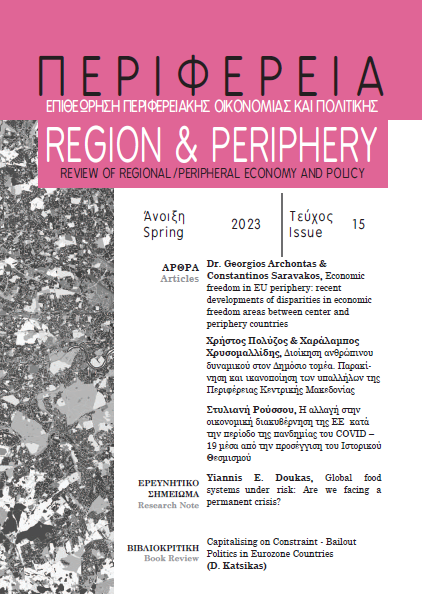Change in EU Economic Governance during the COVID-19 pandemic through the lens of Historical Institutionalism
Abstract
Ιn 2020, the European Union (EU), had to deal with the multidimensional effects of the COVID-19 pandemic. However, in each member state the proposed approach for dealing with the pandemic differed according to the domestic social, economic and political context. The economic implications and their magnitude necessitated a collective EU response at the supranational level to synthesize the various trends and perceptions, combined with a revision of EU’s economic governance architecture, to overcome the pandemic. Like any crisis, the pandemic has the ability to evolve those who manage it. In this case, this article examines, through the approach of historical institutionalism, the evolution of the economic governance of the EU during the pandemic and the shaping of the new economic situation in the EU.
Keywords: European economic governance, economic crisis, COVID-19 pandemic, European integration, institutionalism.
Article Details
- How to Cite
-
Roussou, S. (2023). Change in EU Economic Governance during the COVID-19 pandemic through the lens of Historical Institutionalism. Perifereia | Regional Integration: Politics, Economics, Governance, 15(15). https://doi.org/10.12681/rp.35012
- Section
- Research Articles

This work is licensed under a Creative Commons Attribution-NonCommercial 4.0 International License.
Authors who publish with this journal agree to the following terms:
· Authors retain copyright and grant the journal right of first publication with the work simultaneously licensed under a Creative Commons Attribution Non-Commercial License that allows others to share the work with an acknowledgement of the work's authorship and initial publication in this journal.
· Authors are able to enter into separate, additional contractual arrangements for the non-exclusive distribution of the journal's published version of the work (e.g. post it to an institutional repository or publish it in a book), with an acknowledgement of its initial publication in this journal.
· Authors are permitted and encouraged to post their work online (preferably in institutional repositories or on their website) prior to and during the submission process, as it can lead to productive exchanges, as well as earlier and greater citation of published work.



